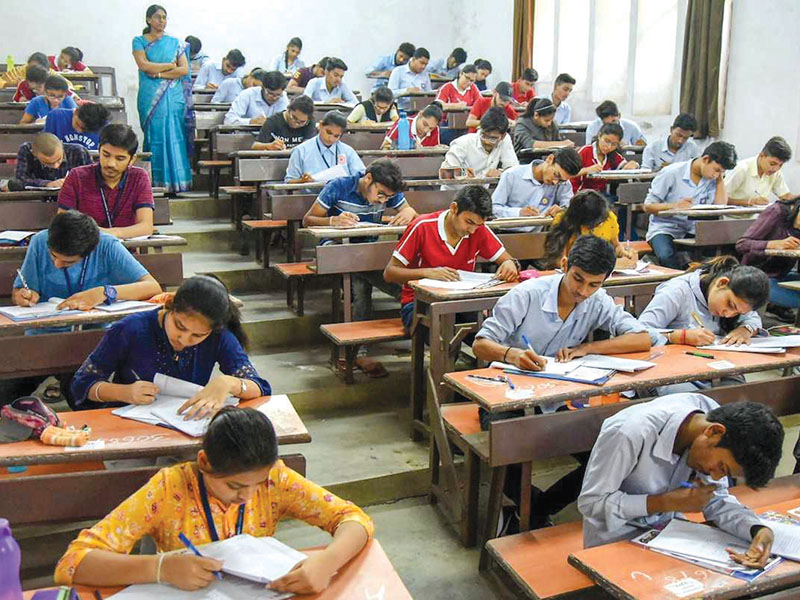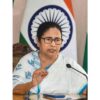Karnataka: Mess & messier
Students writing KCET: out-of-syllabus questionsAn education mess in this southern state which has appropriated its description as the Silicon Valley of India, has become messier. On April 8, the Supreme Court restrained the state’s Congress government from publishing results of board exams held in March for classes V, VIII and IX students of KSEAB (Karnataka School Examination and Assessment Board)-affiliated schools. Because the landmark Right of Children to Free & Compulsory Education (RTE) Act, 2009, prohibits stressful formal exams for children in elementary (classes I-VIII). Now, another controversy has erupted over conduct of the Karnataka Common Entrance Test (KCET) 2024, the gateway for undergrad admissions into 290 professional education colleges statewide.
Soon after 3.34 lakh class XII students wrote KCET on April 18-19, social media was flooded with complaints that test papers included over 50 questions which were beyond the syllabus prescribed for state board pre-university college (PUC) students. Several higher secondary PUC colleges (class XI-XII), faculty and parents’ associations have registered protests with the Karnataka Examinations Authority (KEA) which conducts the test.
KCET is a make-or-break competitive exam for PUC students because it determines admission into all professional colleges statewide providing non-medical higher education — engineering, pharmacy, veterinary science etc. Under a seat-sharing agreement between the state government and private professional college managements, 45 percent of seats in private colleges are allotted to successful KCET students at a subsidised annual fee of Rs.20,000-80,000 (cf. Rs.83,000-Rs.2.3 lakh). This year, an estimated 120,000 private college seats are available for top-ranked KCET students.
According to aggrieved students and parents, several questions were taken from class XI-XII syllabuses of the pan-India CBSE and CISCE exam boards. They contend that this put the majority of students, enrolled in PU colleges affiliated with the state’s Pre-University Board at a disadvantage. Moreover, the state government had ‘rationalised’ the pre-university syllabus in 2023-24, i.e, deleted some chapters of textbooks to reduce curriculum load of higher secondary (PU) students.
With the chorus of public protests getting louder while voting in General Election 2024 has commenced (the first round of voting in Karnataka concluded on April 26 and the second concludes on May 7), the state’s Congress government elected last May (2023) issued a statement on April 28 saying that KEA has been directed not to evaluate students answers to the 50 out-of-syllabus questions. “An Expert Committee Report has determined several questions from the deleted chapters of the rationalised syllabus of 11th and 12th PUC syllabus of 2023-24. Keeping in view the Expert Committee report and opinion of many stakeholders and the paramount interest of protecting the legitimate interests of the students in mind, KEA is directed to remove questions that are out of 2023-24 syllabus from the assessments, and assess (answers to) only the remaining questions. Two questions with incorrect solutions will also be awarded grace marks,” said the complex statement ruling out a re-exam. Moreover, “the KEA is directed to prepare a detailed Standard Operating Procedure for setting question papers for KCET”.
Dr. M. Mohan Alva, president, Karnataka Unaided Pre-University College Managements Association (KUPMA), blames KEA for the question papers mess. “There is lack of co-ordination between the KEA and PU board on the latest rationalised syllabus. The KCET manual clearly states that KCET will contain only questions from the syllabus prescribed for I and II PUC by the PUC board. How can the question paper contain questions from the syllabii of other exam boards? How can KEA finalise question papers without this basic check? This sheer negligence of KEA has caused great distress to students and parents. Even though answers to the the 50 out-of-syllabus questions will not be assessed, the damage is done. Many students were so rattled after reading these questions on exam day that they were not in the right mental state to answer other questions,” says Alva.
Thimayya Purle, honorary president, Karnataka PU Lecturers Association, believes the mess has been caused by KEA inviting lecturers from private colleges to serve on the question papers setting committee. “Earlier, only faculty members of government PU colleges were invited to set KCET papers. Of late, KEA has begun inviting private college lecturers to also set papers. These private college lecturers are setting papers to suit students from CISCE and CBSE board schools. Hence the out-of-syllabus questions in KCET 2024. KEA needs to establish a transparent process and take utmost care that only highly-qualified and experienced lecturers are selected for setting KCET question papers,” says Purle.
KEA director S. Ramya, however, refused to disclose information on the process of selecting question paper setters. “It’s a matter of confidentiality,” she told EducationWorld.
Overhaul of the question paper setting process apart, educationists are demanding a common syllabus for maths and science subjects across all 69 school examination boards countrywide. Several committees of the Union education ministry and the Council of Boards of School Education in India (COBSE) have recommended a uniform syllabus in these subjects for class XI-XII students countrywide, to ensure a level playing field for students writing competitive exams for admission into collegiate undergrad programmes.
However, there is no consensus among the 67 state boards on implementing this recommendation. Thus the out-of-syllabus questions mess in KCET 2024.
Reshma Ravishanker (Bengaluru)


















Add comment